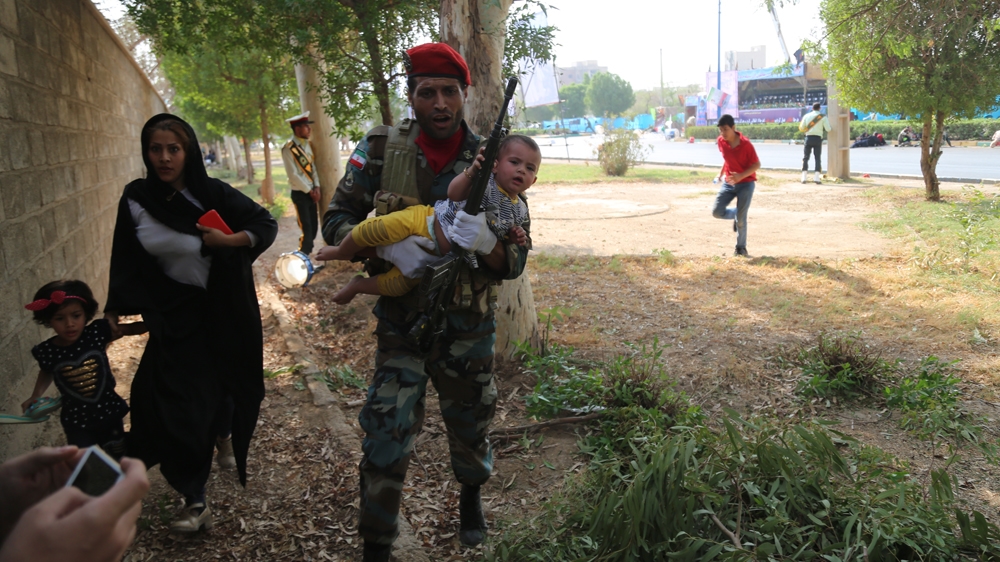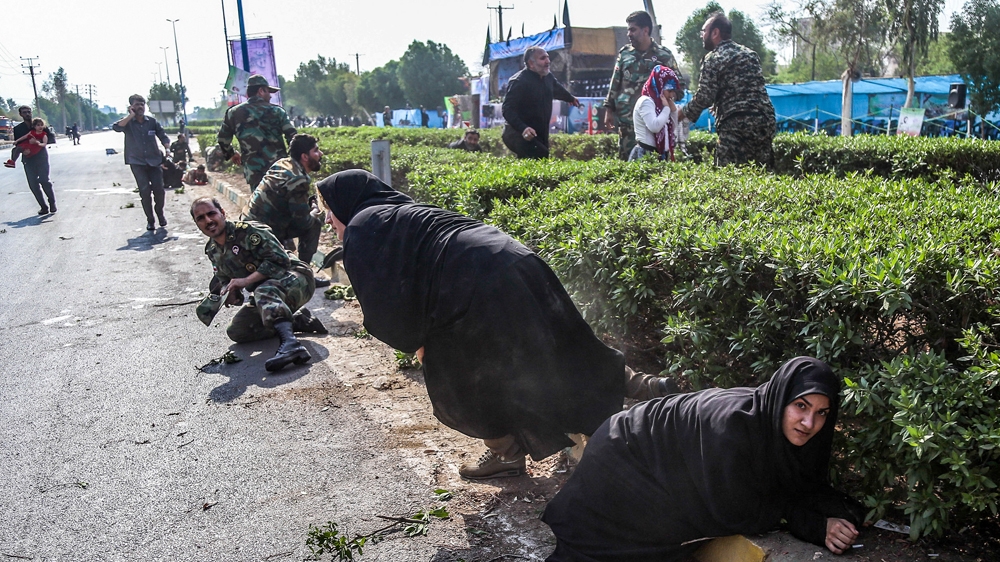Iran: Who was responsible for the deadly attack in Ahvaz?
Iran’s Supreme Leader Ayatollah Khamenei condemned the attack in the southwestern city of Ahvaz, blaming “US-backed regimes in the region” for the “plot”, which left at least 29 people dead and 70 others wounded.
Khamenei urged authorities on Saturday “to chase the trails of the criminals”, as President Hassan Rouhani vowed a “crushing response” to the deadly attack.
Following the bloodshed, questions have now arisen as to who was responsible for carrying it out, and whether Iran would be drawn into a wider conflict with its response.
|
Faking the online debate on Iran | The Listening Post |
Rouhani’s Foreign Minister Javad Zarif blamed “terrorists recruited, trained, armed and paid by a foreign regime” for the attack.
“Iran holds regional terror sponsors and their US masters accountable for such attacks. Iran will respond swiftly and decisively in defence of Iranian lives,” Zarif wrote on social media.
According to the Iranian Students’ News Agency (ISNA), an armed group called Al-Ahvaziya claimed responsibility for the attack, while Islamic State of Iraq and the Levant (ISIL) also said it was behind the assault.
Little is known about the Al-Ahvaziya group, but Revolutionary Guards spokesman Ramezan Sharif told ISNA it is “funded by Saudi Arabia”.
In a statement to Iran International news site, a spokesman was quoted as saying the attack on Saturday “was in response to the repression of Ahvazi Arabs”.
“We do not have a choice but to carry out a resistance.”
Other reports say youth members of the Ahvaz National Resistance Group (ANRG) were responsible.
 |
| Dozens of people, including children, were killed in the attack on Saturday [Mehr News via AFP] |
In a separate statement to the Ahwazna website, Habib Jaber, head of the Arab Struggle Movement for Liberation of Ahvaz (ASLMA), said targeting the Revolutionary Guards “in a military parade in Ahvaz by the national resistance comes within self-defence measures against a terror militia classified globally”.
Among the fatalities on Saturday were children and spectators of the parade, as well as soldiers and elderly war veterans. The parade was held to commemorate the beginning of the Iran-Iraq War.
It was unclear whether ASLMA and ANRG are affiliated with the Al-Ahvaziya group, or if they are part of an alliance.
Brigadier-General Abolfazl Shekarchi, an Iranian military spokesman, told Fars news agency four armed men carried out the attack. Three were killed at the scene while a fourth died in custody from his wounds.
|
Iran attacks: Armed men storm parliament and Khomeini shrine |
Shekarchi said the gunmen were wearing military-style uniforms, and had hidden their firearms in the area days ahead of the attack.
An injured survivor told reporters the gunmen fired “aimlessly” at the crowd.
Ahvaz is the capital city of Khuzestan province, which has the country’s largest oil reserves. With its proximity to Iraq and the presence of a large Arab minority, the area has seen ethnic violence in the past. It was also a frontline in the eight-year Iran-Iraq War.
ISIL likewise claimed responsibility for Saturday’s carnage, although some raised doubts about its involvement. ISIL has a history of attacks inside Iran.
On June 2017, the group was blamed for a series of deadly raids on Iran’s parliament and the mausoleum of Ayatollah Khomeini, leader of the Islamic Republic.
In July, several suspected ISIL members were executed in Iran for the attack. Authorities have also arrested several suspected fighters and thwarted plots by alleged ISIL members.
‘Trapping Iran’
Regardless of who carried out the attack, Trita Parsi, founder of the National Iranian American Council, suggested on social media it was aimed at “trapping Iran” into starting a wider armed conflict that would eventually drag in the US military.
 |
|
An Iran analyst warned Saturday’s attack does not bode well for diplomacy in the region [ISNA/AFP] |
But Mohammad Hashemi, a Tehran-based journalist, noted Iran has experience dealing with similar “blind terrorism” attacks in the 1980s, and wouldn’t rush into any response.
“Iran clearly understands the reasons behind such actions at this time, in view of growing pressure from the US and its allies against the Islamic Republic,” Hashemi told Al Jazeera.
“However, Iran has never taken a hurried and hasty action in response to such terrorist attacks,” he said adding Tehran will “find a suitable time if it decides to give a response and retaliate”.
He also said the attack on Saturday would only strengthen the state’s legitimacy, and rally support among ordinary Iranians amid the ongoing political and economic turmoil.
|
Iranian Guards claims missile attack on Kurdish rebels in Iraq |
Saeed Jalili, a journalist also based in Tehran, said the assault “does not bode well for the future of diplomacy” between Iran, its neighbours and the United States.
“They are basically moving away from diplomacy and getting involved in escalated tension,” he told Al Jazeera.
Recently, the Revolutionary Guards also targeted Iranian Kurdish fighters in Iraq. In 2017, following the ISIL attacks in Tehran, Iran also hit ISIL targets in Syria.
Jalili said the attack on Saturday would only “weaken peaceful ethnic communities”, who have been pushing for their rights through legitimate social reforms.
“Radicalism will unwind all peaceful efforts and shut the way to constructive push for civil rights.”




